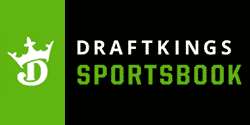Indiana joined the ever-growing list of states with legal sports betting in May 2019 with the passage of a law authorizing retail and mobile sportsbooks.
Under state law, local casinos and off-track betting parlors (OTBs) may accept wagers in-person and online in partnership with Indiana betting sites and third-party providers such as FanDuel, DraftKings, Caesars, and BetRivers.
Indiana Online Sportsbooks


21+ and present in Indiana. Gambling Problem? Call 1-800-9-WITH-IT.
The Indiana betting industry is quickly growing as numerous retail sportsbooks and betting sites across the state go live.
The first retail sportsbooks opened for business on September 1st, 2019 with Indiana Grand, Ameristar East Chicago and Hollywood Casino Lawrenceburg first across the finish line.
Most of the state’s other casinos have since opened their own sportsbooks.
Mobile sports betting got underway about a month later with the launch of DraftKings and BetRivers on October 3rd, 2019. They were followed by FanDuel later that month, BetAmerica in December 2019 and BetMGM in February 2020.
In addition to sports betting, other forms of legal online gambling in Indiana include horse racing betting, and daily fantasy sports.
In-person gambling in Indiana is powered by 12 state-authorized commercial casinos and one Native American casino.
Sports Betting in Indiana
In May 2019, Indiana Governor Eric Holcomb signed into law HB 1015 making Indiana the tenth U.S. state to legalize sports betting.
Here are some of the key points of the new Indiana sports betting law:
- Statewide mobile wagering permitted
- No wagering on esports or on competitions involving amateur athletes under the age of 18
- State tax rate of 9.5 percent of adjusted gross revenue, with a portion allocated to problem gambling
- Geolocation technology limits online betting to residents and visitors within the borders of the Hoosier state
- An initial $100,000 fee for a vendor license, followed by $50,000 annual renewal payments
- Each casino may partner with third-party service providers to launch up to three individual betting sites
- Limits on in-play betting and restrictions on data sources are left to the discretion of the Indiana Gaming Commission
Which Sports Can Be Bet On in Indiana?
Indiana sports betting law allows for betting on baseball, basketball, college basketball, boxing, football, college football, hockey, tennis, golf, mixed martial arts, soccer, cycling, rugby and dozens of individuals leagues among those sports.
The new law does not allow betting on e-sports, high school athletics and amateur sporting events, or any sporting event not approved by the IGC.
Additionally, the IGC has released a thorough list of sports leagues upon which sports betting operators may accept wagers. Readers should note this list is subject to change and does not obligate sportsbooks to offer all of these sports. This list simply details which sports upon which they may accept wagers.
Sports Leagues Approved by the IGC:
Indiana Online Sports Betting
Indiana sports betting law authorizes online sportsbooks and mobile betting apps. Retail sports betting began in September 2019.
Indiana online sports betting sites launched in October 2019 and is permitted for anyone over the age of 21.
Mobile sportsbooks use geolocation technology to ensure all Indiana online betting occurs within state lines. The Indiana Gaming Commission has issued numerous licenses to mobile betting providers and the first online sportsbooks are now live.
Online Sportsbooks Licensed in Indiana:
- FanDuel Sportsbook
- BetRivers.com
- DraftKings Sportsbook
- BetMGM
- PointsBet
- Barstool Sportsbook (Penn Sports Interactive)
- TwinSpires (Churchill Downs Interactive Gaming)
- BetIndiana
- Unibet
- Caesars Sportsbook (Caesars Interactive Entertainment)
- theScore
- WynnBET
In-Person Betting at Indiana Retail Sportsbooks
Indiana sports betting regulations limit all sports wagering to customers 21 and older.
Prefer to experience gambling in real life? Indiana allows licensed casinos, racinos, and off-track betting parlors to take sports wagers. A handful satellite locations have acquired sports betting licenses since the new law took effect on July 1st, 2019.
Given the expansion and growth that is projected, it is no surprise that most casinos in Indiana have already launched in-house sportsbooks.
Horse Racing Betting in Indiana
Horse racing is legal at the federal level thanks to the Interstate Horse Racing Act (IHRA) and an exemption from the Unlawful Internet Gambling Enforcement Act (UIGEA). Under the current legal framework, the legality of horse racing is mostly left in the hands of the states.
Indiana currently allows licensed horse racing and satellite facilities for pari-mutuel wagering. This was legalized in 1989, and the state is now home to many horsing tracks including Hoosier Park and Indiana Downs. Off-track betting parlors were introduced in 1995. Currently, all OTB’s must be owned by the permit holders of the horse tracks.
The Indiana Horse Racing Commission (HRC) currently oversees the regulation of all horse race betting including those occurring at off-track betting, or OTB facilities. The Commission ensures all horse race betting is conducted with the highest of standards and the greatest level of integrity.
Mobile and Online Horse Racing Bets
Online horse racing betting is legal in Indiana under IC §4-31-7.5. In legal terms, this is known as advance deposit wagering and the law was passed as an effort to boost betting handle and revenue for the local racing industry.
The two largest and most trusted websites that offer legal racing betting in Indiana are:
- TwinSpires.com
- TVG.com
To clear up any confusion, we should note the IGC website has an FAQ page claiming online horse racing betting is prohibited. Question 21 on the FAQ asks if online wagers on horse races are legal and provides this answer:
“No. Online wagers on horse races are illegal. The only legal way to place bets on horses in Indiana is at one of the racetracks or off-track betting facilities.”
This FAQ page is clearly outdated as IC 4-31-7.5 specifically authorizes mobile racing betting. Furthermore, BetAmerica and TVG are both headquartered in the United States and are subject to all state laws. Both openly accept customers from Indiana and have had no issue from local authorities.
Indiana Daily Fantasy Sports Sites
Daily Fantasy Sports (DFS) were legalized in Indiana in 2016. Mike Pence signed SB 339 into law making way for sites like Fantasy Draft, DraftKings, and FanDual. When the law went into effect, the Fantasy Sports Trade Association commented, “Today’s news out of Indiana marks another important step in the ongoing process of creating legal clarity for fantasy sports.”
Truth be told, these sites were already operating in the Hoosier state before the passage of SB 339 due to the heavy advertising of daily fantasy sports sites during the 2015 NFL season. The 2016 bill took this into account and allowed game operators who were already operating in Indiana to continue operating through their new license application process.
Oversight of DFS betting was placed with, unsurprisingly, the Indiana Gaming Commission. That Commission went on to create the Sports Wagering and Paid Fantasy Sports Division which is now responsible for administering and regulating Indiana’s sports wagering and paid fantasy sports.
The minimum age to play Daily Fantasy Sports in Indiana is 18 and operators are responsible for ensuring players are at least 18. Interestingly, SB 339 also officially designated fantasy sports as a game of skill. The bill has since been codified at IC §4-33-24.
Daily Fantasy Licensing Requirements
SB 339 creates several requirements of DFS operators. These operators must apply for a license, pay a considerable licensing fee to the tune of $50,000 to $75,000 and stick to a standard of conduct created to protect the integrity of sports and to protect customers of fantasy sites.
These “baked-in integrity” provisions are perhaps why statutory integrity fees failed in Indiana’s new legislation. The conduct DFS operators must adhere to includes: holding player funds in seperate accounts, stop DFS operator employees from sharing confidential information, prevent employees from participating in paid contests with $5 or greater prizes and to prevent anyone involved in actual sports

Mike Murphy is the founder of OnlineBettingSites.com and has over 10 years of experience in the legal online betting industry. A regular attendee of industry trade shows and conferences, Mike is a strong proponent of regulated markets and responsible gambling policies.
